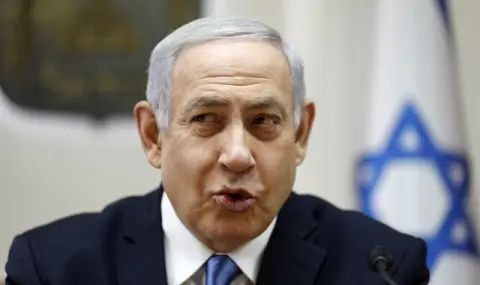Israeli Prime Minister Benjamin Netanyahu said today that Israel is committed to the ceasefire agreement with the Lebanese movement "Hezbollah", but warned that this does not mean that the war is over, Reuters reported, writes BTA.
At the start of a cabinet meeting held in the northern Israeli city of Nahariya, near the border with Lebanon, Netanyahu said that "Hezbollah" has seriously violated the agreement yesterday and that Israel has subsequently attacked over 20 targets on Lebanese territory in retaliation.
"We are currently in a ceasefire regime, I note that this is a ceasefire, not an end to the war,", stressed the Israeli Prime Minister. "We have a clear goal to return residents, to restore the northern part of the country. We are enforcing this ceasefire with an iron fist, acting against any violation, petty or serious,'' he added.
Earlier today, Israeli Defense Minister Israel Katz warned that if the deal fails, the Israeli armed forces will no longer distinguish between Lebanon and "Hezbollah".
During a visit to the Israeli-Lebanese border, Katz called on the Lebanese government to "authorize the Lebanese army to implement its part (of the agreement), to hold "Hezbollah" away from the Litani River and to dismantle all the infrastructure" of the grouping.
"If the ceasefire fails, the state of Lebanon will not be freed. We will enforce the agreement with maximum effect and zero tolerance. If until now we have distinguished between Lebanon and "Hezbollah", this will no longer be the case, he added.
After dozens of military operations by Israeli forces on Lebanese territory, which Beirut sees as violations of the ceasefire agreement, two senior Lebanese political sources told Reuters that senior Beirut officials had called on Washington and Paris to pressure on Israel to comply with the terms of the agreement.
Deadly Israeli strikes against southern Lebanon and the firing of rockets by "Hezbollah" at an Israeli military post yesterday placed the US-brokered deal between the two countries in an increasingly precarious position, less than a week after it came into effect.
Lebanon's acting prime minister, Najib Mikati, and parliament speaker Nabih Berri, a close ally of Hezbollah, which brokered the deal on behalf of Lebanon, held talks with White House and Elysee Palace officials and expressed concern over relation to the state of ceasefire.
Representatives of neither the French presidency nor the French foreign ministry were available for comment, Reuters notes.
Yesterday, French Foreign Minister Jean-Noel Barrot spoke with his Israeli counterpart Gideon Saar, saying both sides must stick to the ceasefire.
US State Department spokesman Matthew Miller told reporters yesterday that the ceasefire "is holding" and that the US had "anticipated that there might be violations".
The cease-fire came into effect on November 27 and prohibits Israel from conducting offensive military operations on Lebanese territory, while requiring Beirut to prevent armed groups, including Hezbollah, from carrying out attacks against Israel. According to the agreement, Israel has 60 days to withdraw its troops from southern Lebanon, notes Reuters.
A monitoring mechanism, chaired by the US, is already in place and will be tasked with monitoring, verifying and facilitating compliance with the ceasefire, but it has not yet started work.
At least 12 people were killed in Israeli strikes on Lebanon yesterday, Lebanese authorities said, in the deadliest day since the ceasefire agreement came into effect. Among the dead are six people from the city of Harris and another four from the city of Talusa, according to data from the Lebanese Ministry of Health.
